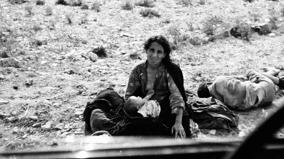Details
This wartime newsreel from 1942 documents the efforts of China to deal with Japanese aggression.
-
producerStuart Legg
-
scriptStuart Legg
-
editingStuart Legg
-
narratorLorne Greene
Education
Ages 15 to 17
School subjects
Supplement to the study of World War II from the Chinese perspective as China struggles with the advancing Japanese. Discuss the concept of “the common good” as it applies to China’s efforts to stave off the Japanese threat. Have students comment on the involvement of women and children in the war effort. Discuss why China was considered a leader in military strategy early in the war. Have students comment on the tone of the film’s narration.


















